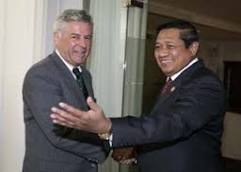17 May 2013
On 17 May 2013 the Indonesia Nederland Society (INS) organized a Roundtable in The Hague with keynote speaker Mr. Pieter C. Feith, Head of the EU-led ACEH Monitoring Mission (AMM) in Indonesia in 2005 – 2006, and international crisis management expert.
The Aceh Monitoring Mission was the first European Security and Defense Policy operation in Asia and was conducted with five participating states from the Association of Southeast Asian Nations (ASEAN).
The first contacts between the Indonesian government and the Free Aceh Movement (GAM) had already taken place before the December 2004 tsunami struck. But the disaster consolidated the political will to overcome old grievances and join forces in the reconstruction process and to create a sustainable future for the people of Aceh. As survivors of a devastating tsunami and a thirty-year conflict, Aceh’s people were longing for peace and stability. Pieter Feith perceived ‘trust building’ conditional to the ongoing peace and reconciliation and post-conflict reconstruction processes. Crucially important to the successful start of the mission was the presence of the contributing countries in Aceh from the day the agreement was signed. The AMM started decommissioning GAM weapons on the first day of the official mission. ‘The determination of both parties, considerable pressure from Aceh’s people, and significant support from the international community helped ensure a solution to the thirty-year armed conflict with dignity for all.’
In the discussion following Pieter Feith’s speech, one of the participants – who compared the successes of the AMM with the laborious UN monitoring missions in Congo, one of which he had been in charge of – expressed: ‘Maybe the DCR needs a tsunami!’. Other participants from the city of Apeldoorn called the cooperation of their municipality with Aceh after the tsunami. One of the city’s post tsunami projects was the establishing of a demand driven training center for civil servants.
A Dutch medical specialist who was at Sumatra during the tsunami, told the story of how an aid initiative by Dutch and Indonesian volunteers and Bronovo Hospital (The Hague) became successfully integrated in a large aid program by the Indonesian governance in cooperation with the Indonesian army, the Embassy of Indonesia in The Hague and the Dutch governance.




